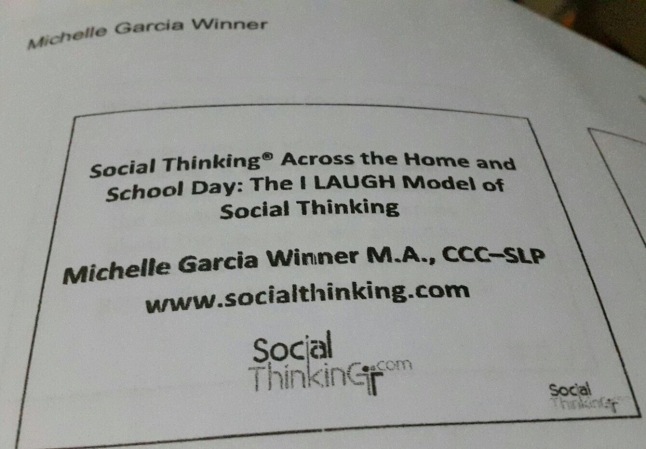With the opening of occupational therapy and the sudden increase in inquiries and clients (we’re actually considering hiring another speech therapist), September so far has been a blur and we have just realized that the month’s almost at an end. But a full schedule and the existence of a waiting list aren’t the only ways we measure productivity. September is also an eventful month for people who work with children. This is the month developmental pediatricians assembled in one teachable event, a world-renowned speech therapist came to the country to talk about her increasingly popular therapy framework, and people from different provinces and countries went to Manila’s five-day book fair. Seeing those events as opportunities to enrich our practice and our center and to better help our clients realize their potentials, we took the time to attend all three. And because sharing is caring, we will impart a few takeaways from each event.
QUINDECIM: The 8th Biennial Developmental and Behavioral Pediatricians’ Convention
On September 1 and 2, we attended the every-other-year convention held by the Developmental and Behavioral Pediatricians Society of the Philippines (DBPSP). Entitled Quindecim (meaning fifteen in Latin), the society celebrates its decade and a half of existence, having its inception in 1999 and foundation in 2000. “Reminiscing, experiencing and hoping” which was also meant “past, present and future” was a recurring theme during the discussions and lectures facilitated not only by developmental and behavioral pediatricians, but also other professionals who work with individuals with special needs.
Being at this convention helped us promote our therapy center to developmental pediatricians who, in the ideal setting refers students to us for occupational and/or speech therapy. But more importantly, we learned and relearned plenty of things from the lectures and discussions. Here are some of them:
1. “It is easier to build strong children than to repair broken men.” This is a quote by Frederick Douglass, as mentioned in Dr. Joel Lazaro’s lecture “CATCH THEM BEFORE THEY FALL: Framework for Linking Brain Plasticity and Early Intervention”. This is first on the list and aptly so because we cannot stress enough how important EARLY INTERVENTION is to a child’s overall development. It is crucial to start early as far as child development is concerned because the brain is highly plastic (moldable, open to change) the younger the child is. This plasticity peaks around ages 5 to 7 before it starts to become less and less adaptable due to the structures of the brain becoming fully formed at age seven.
2. Minimum screen time for children. Since we started practicing in 2010, we have been telling parents to avoid or at least limit exposing their children to television and gadgets. Some of them follow this recommendation while others say they will. As parents, or at least people who know how tiresome it is to take care of children, we know how giving our kids their much wanted iPad or leaving them in the couch watching Dora the Explorer for hours on end in turn gives us the peace and quiet we so need. But as therapists, we know doing this would be counterproductive to developing good work behaviors and learning language among other developmental skills. We tell parents to limit doing something that’s easy and pleasurable to both them and their kids but when they ask how much screen time is just right, we would give varying answers. We are so unsure of the figures at times that our clients do not find us confident and so they end up not following our advice. Now, thanks to the info from the same lecture by Dr. Lazaro, we now have these numbers to back up this no-screen prescription (from Aaron Ramos’ Facebook page):

3. Transition and self-advocacy
The convention also had a panel discussion about transition, and how it isn’t only about helping adolescents and adults get jobs. Transition happens anytime change in context happens. It can happen as early as toddlerhood. And it can be as simple as moving on from high school to college, which was exactly what the panelists discussed. One of them, a college student from the College of St. Benilde and an individual with ADD, talked of doing self-advocacy, how it isn’t easy, and how we can train ourselves to be self-advocates.

There were other topics at the convention and many of them were a mouthful. But we did not get to engage in continuing education in a long time, so after two weeks, we set out to a much nearer Alabang and attended…
Michelle Garcia Winner’s Social Thinking Seminar

This September 17-18 event was MGW’s (let’s call her that for the rest of this post) second seminar on social thinking in the Philippines (the first one happened in 2011). For a second-time stint, she had plenty of different but not necessarily new things to teach – some of them newer ways of teaching social thinking. The basic thoughts and principles however, stayed the same. Some of them being:
1. Social thinking happens all the time. Even when we’re not talking or being around others.
2. We must think with our eyes (though she did not expound on full body listening this time around).
3. Language and communication are highly nuanced.

We then capped our September in terms of acquiring new things by visiting the…
36th Manila International Book Fair

Held on September 16-20, this annual book fair is frequented not only by people who like to read, but also by those who work with children, as they have booths that sell educational books and toys with discounts. There are also booths of popular bookstores like National…

…and Fully Booked, which lived up to its name on the fair’s last day.

By the end of my visit, my bags were full with toys and books…

…and magazines for our center’s waiting area.

May October be as awesome as our September has been. Happy end of the month!
